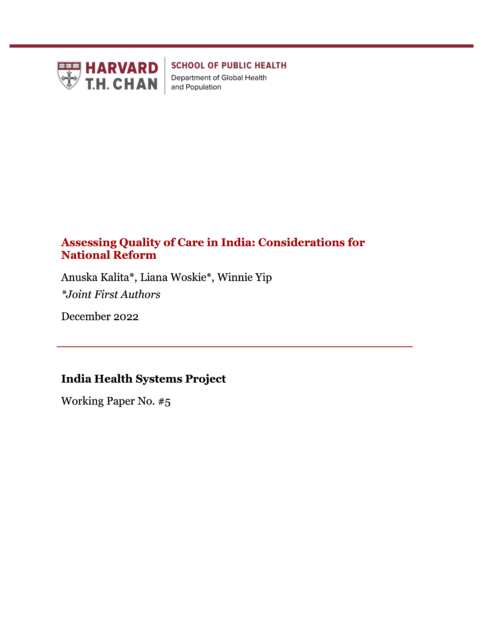Assessing Quality of Care in India: Considerations for National Reform
By Anuska Kalita*, Liana Woskie*, and Winnie Yip
*Joint First Authors
December 2022
Even as the availability and affordability of healthcare improve, many countries are not experiencing anticipated gains in health outcomes. One potential driver for stagnating health outcomes is low-quality health services. For example, between 5.7 and 8.4 million deaths are estimated to result from poor-quality healthcare each year in low- and middle-income countries (LMICs). While people may have better access to health services, the quality of those services is highly variable. At best, healthcare can improve health and save lives; but it can also cause physical harm and erode trust. India has recently implemented several major healthcare reforms at national and state levels, yet the nation continues to face significant challenges in achieving better health system performance.
These challenges are particularly daunting in India’s poorer states, like Odisha. While the focus of several past and newer health policies has been to improve access to care and financial risk protection, there have been few initiatives to improve quality of care in the country. Importantly, there is limited data on quality of care, which often impedes an assessment of the extent and scale of the problems, diagnosing the causes behind them, and designing evidence-based solutions to address it. In this context, the Harvard T.H. Chan School of Public Health conducted a comprehensive study in Odisha to assess quality of care. We assessed quality of care along three aspects: clinical effectiveness, patient safety, and patient-centeredness. These three aspects of quality are the major gaps in existing knowledge, but they are the critical components of healthcare linked to patient outcomes. Using an interconnected set of surveys–patients at outpatient and inpatient exit interviews, interviews with primary care providers using clinical vignettes, and interviews with hospital staff, allowed us to assess three aspects of healthcare quality: patient safety, patient-centeredness, and clinical effectiveness.
In this working paper, we present the following: (1) a summary of the key findings on the three aspects of quality: clinical effectiveness, patient safety, and patient- centeredness; (2) a brief diagnosis of possible causes behind our findings; and (3) some recommendations for reforms to improve quality based on global experiences.
Resources
Download this Working Paper here.
